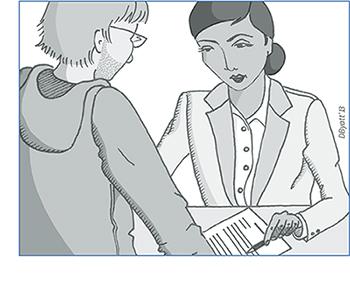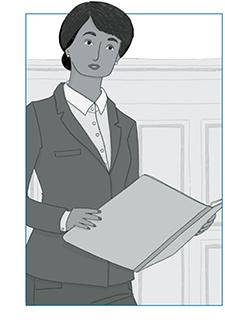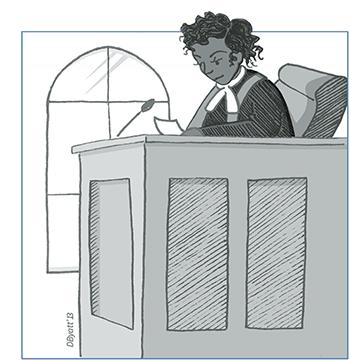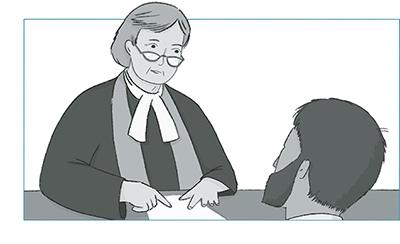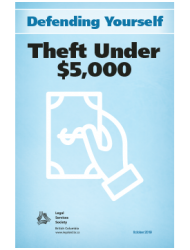Defending Yourself: Theft Under $5,000
On this page
This resource is for people who want to plead not guilty to a charge of theft under $5,000. Use this resource if you don’t qualify for legal aid, you can’t afford a lawyer, and you plan to represent yourself (be your own lawyer) in court.
You should represent yourself only if you don’t qualify for legal aid and you can’t afford a lawyer. If you choose to do this, be sure to talk to a lawyer for advice before your trial. Some legal help is better than none. See Where can I get legal help?
This resource explains how to defend yourself when you’re charged with theft under $5,000. It doesn’t try to cover every situation. For detailed information, speak to a lawyer about your case.
Are you Indigenous?
Indigenous peoples include First Nations, Métis, and Inuit. If you’re Indigenous and charged with a crime, the judge must apply Gladue principles when sentencing you. This means the judge must consider your personal and unique circumstances as an Indigenous person and options other than jail. Gladue principles apply to all Indigenous peoples. They also apply whether you live on or off reserve. See the BC First Nations Justice Council for more information.
Introduction
Generally, theft is taking, or trying to take, property that belongs to someone else, without the owner’s consent and with the intention of stealing. The theft is committed as soon as the property is picked up or moved with the intention of stealing it. The property can be anything from food in a grocery store to a neighbour’s dog.
Shoplifting is a common example of theft under $5,000. If you take, or try to take, something from a store and you don’t intend to pay for it, that is theft. You can be charged even if you didn’t leave the store.
Depending on the details of what happened and your criminal record, the Crown prosecutor (also called the Crown) can choose to charge you with either a summary offence or indictable offence. You could get a jail sentence for either type of offence.
If the Crown proceeds “summarily,” the maximum jail sentence a judge could give you is two years less a day in jail, or a fine of up to $5,000, or both. But the judge could give you a shorter sentence or a sentence that doesn’t include jail at all (especially if you don’t have a criminal record).
If the Crown proceeds “by indictment,” the judge could give you a longer jail sentence of up to two years or up to 10 years for the theft of a motor vehicle.
The first time you’re in court, ask the Crown if they’re proceeding “summarily” or “by indictment.” The Crown should also say whether they’re asking for a jail sentence. The Crown should also provide you with:
- particulars,
- details of the Crown’s case, and
- an Initial Sentencing Position, which tells you what the Crown would be seeking as a sentence if you were to plead guilty.
Do not plead guilty before speaking to a lawyer.
If the Crown says they’ll:
- proceed “by indictment,”
- ask for a sentence that includes jail, or
- ask for a sentence that will have other serious consequences for you,
immediately ask the judge to adjourn your case so you can get legal help.
If the Crown proceeds “by indictment” (or is asking for a jail sentence), you’ll usually have a better chance of getting legal aid — so be sure you understand how the Crown will proceed. Legal Aid BC may change its decision to not cover your case.
You can ask the court to appoint a government-funded lawyer to your case (a Rowbotham application) if:
- you can’t afford a lawyer, were denied legal aid and appealed your denial and were still denied,
- the Crown says that they’ll seek a jail sentence if you’re found guilty, or will seek any other type of sentence that will have serious consequences for you; and
- your case is too complicated for you to handle.
For more information on whether you’re eligible to apply for a Rowbotham order, see If You Can’t Get Legal Aid for Your Criminal Trial.
Before the trial
When you prepare your defence, think about what evidence you can use. Evidence includes witnesses, documents, videos, recordings, or your own personal testimony. You don’t have to personally testify. You should ask a lawyer if it’s a good idea to testify. You have the right to not testify.
Make sure the Crown has given you all the evidence that they’ll use (called the disclosure), such as security videos or witness statements before the trial date. The Crown should also tell you who they’ll call as a witness. You can send them a letter or email asking for this information. (See a sample letter in Representing Yourself in a Criminal Trial.)
Prepare to provide truthful and relevant evidence to the court. For more information about the trial process, such as how to deal with witnesses, prepare questions, and decide whether to testify yourself, see Representing Yourself in a Criminal Trial.
A common way to defend yourself against a charge of theft under $5,000 is to show that you didn’t intend to take the property from the property owner. Sometimes the only way you can show that is by testifying yourself.
Remember: you have the right to not testify. Speak to a lawyer before you decide whether you should testify.
To defend yourself against a charge of theft, you may be able to use one (or more) of the following five points, if they’re true:
You could explain that you bought the property, and show the judge your receipt.
You could argue that you had colour of right (an honest claim to the property). With this argument, you would explain why you believed the property was yours.
You could argue that you didn’t intend to steal the property — for example, you simply forgot to pay for it.
You would have to explain your state of mind when the alleged theft happened to support your claim of not intending to steal. This could be done through your own testimony or other forms of evidence. If you decide to use this defense, talk to a lawyer.
You could argue that you got the property some other way and you didn’t know it was stolen.
If the police got evidence of the theft by violating your rights under the Charter of Rights and Freedoms, the judge might not let the Crown use that evidence. And if that happens, and there is no other evidence proving your guilt, you can ask the judge to dismiss the charge against you.
For example, under the Charter, the police must do the following when they arrest you:
- tell you immediately what they’ve arrested you for;
- tell you immediately that you can talk to a lawyer, and let you do so in private before questioning you or taking any samples;
- give you access to a phone to speak to a lawyer privately; and
- tell you that you can get free legal help. (Legal Aid BC has lawyers available 24 hours a day to talk over the phone for free to people in police custody. This service is called the Brydges Line.)
Don’t make any statements to the police or anyone else before speaking to a lawyer.
If the police didn’t do all the things listed above (or others that the Charter requires, such as get a search warrant before searching your house or belongings), you can say that they violated your rights. You would then say that the Crown shouldn’t be able to use any statements you made or other evidence that the police got by violating your rights.
However, the judge won’t automatically throw out the evidence in question. You must also show that accepting the evidence will reflect badly on how justice is carried out in Canadian courts.
If you plan to argue that your Charter rights were violated, talk to a lawyer before your trial. Using the Charter is complicated and usually requires legal research. You must tell the Crown in advance if you plan to use this type of argument.
At the trial
At the trial, before you can present your defence, the Crown will present its case against you.
The Crown must prove beyond a reasonable doubt that you’re guilty of all the elements that make up the crime of theft under $5,000. To do this, the Crown presents evidence to the court using witnesses, documents, videos, or recordings.
If the Crown tries to use evidence that they didn’t tell you about in advance, you can object and ask the judge to dismiss the case or postpone the trial.
You can cross-examine the Crown’s witnesses, but you’ll normally do so only if you disagree with their information. You can ask relevant questions about what the witness saw or knows. You can also ask leading questions, which means making a statement and asking a witness if they agree with it. For example, you could ask “Isn’t it true that you couldn’t really see what happened?” For more details about how to cross-examine, see Representing Yourself in a Criminal Trial.
For a judge to find you guilty of theft under $5,000, the Crown must prove the following:
The Crown must prove that you’re the person who committed the crime. To do this, the Crown will call witnesses, including police officers, to give evidence. The witnesses will probably describe the person they saw commit the crime. Then the Crown will ask the witnesses to say if that person is in the courtroom.
The evidence, either from the witnesses or from other sources (such as fingerprints or videotapes), must show that you’re the person who committed the crime.
The Crown must prove:
- that the crime happened in BC,
- the date of the crime, and
- the specific location where it happened.
These details are included on the Information. This is the official court form (listing the date, place, and type of offence) that the Crown will give you before the trial as part of your particulars. The Crown must still prove these details at the trial.
The Crown will usually call a witness to give evidence about the date and place of the crime. This witness will likely be the investigating police officer, a store detective or loss prevention officer, and the property owner.
The Crown must prove that you intended to take something from the property owner, even if only for a short time.
A clear example is shoplifting: you took the steak from the supermarket, and you didn’t intend to pay for it. Or you took a bike from somebody’s front porch, and the owner of the bike didn’t give you permission to take it.
To prove that you meant to commit the crime, the Crown will usually call witnesses to testify. For example, store security guards might tell the court that they saw you pick up an item and take it out of the store without paying for it. Guards might also say that they then stopped you and got the stolen item from you. If the guards stopped you before you left the store, you can still be convicted if the Crown can show that you were going to take the item without paying for it. Even moving an object from one place to another inside the store with the intention of stealing it is a theft.
The investigating police officers can testify that, when they arrived, the security guard had detained you.
If you voluntarily admitted to anyone (such as the property owner or the police officer) that you took the property without planning to pay for it, that person can tell the court what you said. The Crown can use anything you said (or wrote) to show you intended to steal the property. (They must prove in court that it was voluntary.) If you made a statement or confession, speak to a lawyer and get advice on how you may be able to keep it out of court.
If the Crown proves that you had property that was recently stolen, the judge can decide that you must have stolen it. They’ll find you guilty of theft unless you can explain how you got the property.
The Crown must prove that the property belongs to someone else and not to you. The Crown may ask the property owner (or, in the case of a business, their agent) to be a witness. The owner (or the agent) will testify that the property belongs to them (or the business). The owner will also identify the property as the stolen property. In the case of shoplifting, the store security guard will identify the property.
Don’t plead guilty to the charge of theft under $5,000 without talking to a lawyer.
Sometimes, but rarely, the Crown uses an affidavit to prove some of the points in its case. If the Crown plans to use an affidavit, they should give you a copy of this document before the trial. If you disagree with it, or think it should include other information, ask the Crown and the court to make the person who swore the affidavit come to the trial. Then you can question that person about the information that they swear is true.
After the Crown finishes presenting its case, it’s your turn. You now have your chance to use the points you’ve prepared as your defence. You can use your gathered evidence, call witnesses, and, if you want to, give evidence as a witness yourself. It may be necessary for you to testify if, for example, the Crown proves that a property in your possession was recently stolen. You have the right to not testify. Ask a lawyer whether you should testify. See Representing Yourself in a Criminal Trial for more details.
After you’ve finished presenting your defence, you close your case. Tell the judge why you think the Crown didn’t prove that you’re guilty beyond a reasonable doubt. Mention if you think the Crown’s case was weak or inconsistent in any area. This summary is called your submission. See Representing Yourself in a Criminal Trial for more details.
Once you and the Crown have finished speaking, the judge will decide if you’re guilty or not. If the judge finds you guilty, you’ll get a sentence. The sentence depends on the details of the offence and your criminal record. It could be any of the following:
- an absolute discharge (your record won’t show a conviction)
- a conditional discharge (you’ll be regarded as not having been convicted if you meet conditions that the judge sets)
- probation (a “suspended sentence” including various conditions, for example, community service)
- a restitution order (you must pay money to the victim)
- a fine (up to $5,000)
- a conditional sentence (most often means house arrest for jail sentences of less than two years, which is like a jail term, but you serve it in the community)
- a jail term (up to two years less a day for a summary offence; up to two years for an indictable offence — or up to ten years for theft of a motor vehicle)
A judge usually only grants an absolute or conditional discharge when an accused person has pleaded guilty and doesn’t have a previous criminal record.
If you’re found guilty of stealing from your employer and you were in a position of trust (for example, if you were a bookkeeper or a cashier), the judge will treat the matter very seriously. You may get a jail term even if you stole only a small amount and have no criminal record.
You get a chance to speak to the judge before they decide your sentence. (This is called speaking to sentence.) The judge will give you a chance to explain why you committed the crime, why you won’t do it again, and whether you need help for any problems you may have that were connected to the crime. Speaking to sentence is important because it gives you a chance to explain your situation to the judge. You can ask for a lower sentence than what the Crown is asking for. Read Speaking to the Judge Before You’re Sentenced before you go to court.
The maximum fine for most summary offences is $5,000. If the judge fines you, you can ask for time to pay. Tell the judge how much you can pay each month. If you think you will run out of the time set for paying your fine, you must come back to court and get an extension. Do this as soon as possible.
You’ll usually also have to pay a victim surcharge, which is 30 percent of your fine, or $100 for a summary offence, or $200 for an indictable offence. The judge can reduce the amount or drop the surcharge completely if you show that paying it would cause you undue hardship. For example, this could be because you:
- are unemployed,
- are homeless,
- don’t have assets, or
- have significant expenses for your dependant(s).
Being in jail isn’t an undue hardship.
Even if you can’t afford a lawyer to represent you in court, it’s a good idea to talk to one before your trial or before you decide to plead guilty.
Criminal Duty Counsel
Speak to duty counsel at the courthouse where you’re charged. Duty counsel are lawyers who give free legal advice. When they’re available, they can give you brief, summary advice about the charges against you, court procedures, and your legal rights. Duty counsel can also speak on your behalf the first time you appear in court, but they can’t act as your permanent lawyer or help you at your trial.
Legal Aid BC
Call Legal Aid BC at 604-408-2172 (Greater Vancouver) or 1-866-577-2525 (elsewhere in BC) or your local courthouse to find out when duty counsel will be there. See the Provincial Court of BC website for links to courthouse locations.
Lawyer Referral Service
If you don’t know a lawyer who handles criminal cases, contact the Lawyer Referral Service to get the name of a local lawyer to talk to for 15 minutes for free. You can find out what they’d charge if you need more help and decide whether you want to hire them. Call the service at 604-687-3221.
Access Pro Bono
Access Pro Bono runs free legal advice clinics throughout the province. To make an appointment, call 604-878-7400 or 1-877-762-6664.
University of British Columbia’s Indigenous Community Legal Clinic
The University of British Columbia’s Indigenous Community Legal Clinic in Vancouver’s Downtown Eastside provides free legal advice, accompaniment to court, and advocacy to Indigenous people who don’t qualify for legal aid. Call 604-822-5421 (Greater Vancouver) for more information.
BC First Nations Justice Council
The BC First Nations Justice Council operates justice centres and provides Gladue services. Call 1-877-602-4858 for more information.
Indigenous Justice Centres
Indigenous Justice Centres, run by the BC First Nations Justice Council, offer culturally appropriate advice and representation services at across BC.
Eligible callers can also get help through the Virtual Indigenous Justice Centre (VJIC). Call 1-866-786-0081 for more information about the VIJC.
Native Courtworker and Counselling Association of BC
You can get support from a Native courtworker. The Native Courtworker and Counselling Association of BC helps Indigenous people involved in the criminal justice system. Call 604-985-5355 (Greater Vancouver) or 1-877-811-1190 (elsewhere in BC) for more information.
Law Students’ Legal Advice Program (LSLAP): University of British Columbia
You can get free legal advice or help if you’re charged with a summary offence and the Crown isn’t asking for a jail sentence if you’re found guilty. To find the nearest LSLAP clinic location, call 604-822-5791 or visit the LSLAP website.
The Law Centre: University of Victoria
If you live in Victoria, The Law Centre may be able to help you. Call 250-385-1221 for more information.
Community Legal Clinic: Thompson Rivers University
If you live in Kamloops, Thompson Rivers University’s Community Legal Clinic can provide you with free legal help and advice. Call 778-471-8490 for more information.
Contact a lawyer in private practice Find out if the lawyer is willing to help and what it will cost. Even if you pay for just one or two meetings to get basic advice about your particular case, it could be worth the cost.
Get help from a legal advocate
Find a legal advocate at a local organization on the Clicklaw HelpMap.
Visit the Clicklaw website
For more information about the law, visit Clicklaw. The website has links to legal information, education, and help. You can find out about your rights and options, get toll-free numbers for law-related help, and learn about the law and the legal system.


